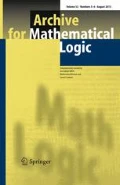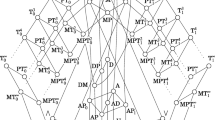Abstract
Polynomial clone reducibilities are generalizations of the truth-table reducibilities. A polynomial clone is a set of functions over a finite set X that is closed under composition and contains all the constant and projection functions. For a fixed polynomial clone \({\fancyscript{C}}\) , a sequence \({B\in X^{\omega}}\) is \({\fancyscript{C}}\) -reducible to \({A \in {X}^{\omega}}\) if there is an algorithm that computes B from A using only effectively selected functions from \({\fancyscript{C}}\). We show that if A is Kurtz random and \({\fancyscript{C}_{1} \nsubseteq \fancyscript{C}_{2}}\) are polynomial clones, then there is a B that is \({\fancyscript{C}_{1}}\) -reducible to A but not \({\fancyscript{C}_{2}}\) -reducible to A. This implies a generalization of a result first proved by Lachlan (Z Math Logik Grundlagen Math 11:17–44, 1965) for the case |X| = 2. We also show that the same result holds if Kurtz random is replaced by Kolmogorov–Loveland stochastic.
Similar content being viewed by others
References
Ágoston, I., Demetrovics, J., Hannák, L.: On the number of clones containing all constants (a problem of R. McKenzie). In: Lectures in Universal Algebra (Szeged, 1983), Colloq. Math. Soc. János Bolyai, vol. 43, pp. 21–25. North-Holland, Amsterdam (1986)
Bulitko V.K.: Reducibility by Zhegalkin-linear tables. Sib. Math. J. 21(3), 332–339 (1980)
Degtev A.: Comparison of linear reducibility with other reducibilities of tabular type. Algebra Logic Russ. 21(5), 339–353 (1982)
Downey R., Hirschfeldt D.: Algorithmic Randomness and Complexity. Springer, Secaucus (2010)
Folland, G.B.: Real Analysis, 2nd ed. Pure and Applied Mathematics (New York). Wiley, New York (1999); Modern techniques and their applications, A Wiley-Interscience Publication
Jockusch C.G. Jr: Semirecursive sets and positive reducibility. Trans. Am. Math. Soc. 131, 420–436 (1968)
Lachlan A.H.: Some notions of reducibility and productiveness. Z. Math. Logik Grundlagen Math. 11, 17–44 (1965)
Merkle W.: The Kolmogorov–Loveland stochastic sequences are not closed under selecting subsequences. J. Symb. Logic 68, 1362–1376 (2002)
Nies, A.: Computability and randomness. In: Oxford Logic Guides, xv + 443. Oxford University Press, Oxford (2009)
Odifreddi P.: Classical Recursion Theory (Volume I). North-Holland, Amsterdam (1989)
Odifreddi P.: Reducibilities. In: Griffor, E.R. (ed.) Handbook of Computability Theory, Studies in Logic and the Foundations of Mathematics., pp. 98–102. Elsevier, Amsterdam (1999)
Post, E.: The two-valued iterative systems of mathematical logic. Ann. Math. Stud. 5 (1941)
Wang, Y.: Randomness and Complexity. Ph.D. Thesis, University of Heidelberg (1996)
Author information
Authors and Affiliations
Corresponding author
Additional information
This material is based upon work supported by the National Science Foundation under Grant No. 0901020, and formed part of the author’s Master’s thesis at the University of Hawai’i at Mānoa. The Master’s Committee consisted of Bjørn Kjos-Hanssen (chair) and Ralph Freese.
Rights and permissions
About this article
Cite this article
Culver, Q. Polynomial clone reducibility. Arch. Math. Logic 53, 1–10 (2014). https://doi.org/10.1007/s00153-013-0351-x
Received:
Accepted:
Published:
Issue Date:
DOI: https://doi.org/10.1007/s00153-013-0351-x



